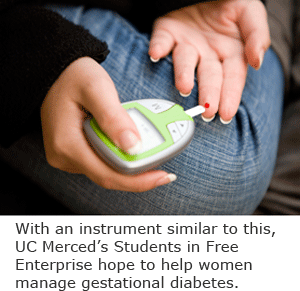

UC Merced may still be a young campus, but that doesn't prevent its students from striving for audacious goals. One enterprising group of students aspires to change the face of how diabetes is managed in the Merced area.
The local chapter of Students in Free Enterprise (SIFE), under the guidance of management lecturer S.A. Davis, is creating a telehealth initiative to help women manage gestational diabetes without having to make frequent trips to the doctor.
Telehealth (or telemedicine) is a method in which medical information is electronically exchanged, closing the gap between the impoverished and top-notch health care.
SIFE is an international nonprofit that works with leaders in business and higher education to mobilize college students to make a difference in their communities while developing the skills necessary to become socially responsible executives. SIFE teams apply business concepts to develop outreach projects that improve the quality of life for people in need. SIFE competition is stiff because teams aren't just judged on the value of their concepts but also on the results delivered.
“It's not enough to have a great idea,” said junior John Chritton, a cognitive sciencesmajor who has been on the team since its inception. “You have to prove it works.”
Most SIFE teams focus on international outreach programs, but UC Merced's team decided to focus on local needs, an example of the campus' commitment to serving the San Joaquin Valley.
“The Central Valley is vastly underserved when it comes to health care,” said chapter President Jessica Gibson, a fourth-year managementmajor. “The purpose of telemedicine is to offer specialty medical services that are not otherwise available.”
The team chose to focus on diabetes in its project, Gibson said, because the disease is so prevalent in the Central Valley and poses a laundry list of preventable side effects.
“It can't be cured, but it can be managed,” she said.
Gestational diabetes puts both mother and child in danger. Women with gestational diabetes are at a higher risk of developing preeclampsia (high blood pressure) during pregnancy and general diabetes later in life. Infants born to diabetic mothers often have increased body mass (which makes metabolic regulation difficult), developmental problems and jaundice.
Managing gestational diabetes in Merced County is difficult because of inadequate access to health-care providers and cultural norms that prevent women from making regular visits to the doctor. By enabling blood-sugar data to be digitally transferred from monitor to doctor, telemedicine practices eliminate the need for multiple doctor visits and give physicians necessary information without requiring the patient to be in the office.
The UC Merced SIFE team is working with the Merced Diabetes Center to provide telemonitoring devices to women with gestational diabetes to track blood sugar levels.
Right now, the team is actively courting sponsors who could cover the cost of the glucometers and the software needed to collect and track data from the monitors.
Gibson said the team has been embraced by the local medical community and has forged partnerships with health care professionals to handle device delivery, tracking and educating patients on the use of their devices. The only gap left to fill is acquiring the actual devices, which cost hundreds of dollars each.
Dr. Robert Streeter, vice president of medical affairs at Mercy Medical Center in Merced, has helped the students navigate through the local medical community and said he sees great potential in the SIFE team's project, especially considering the Central Valley's shortage of primary and specialty physicians.
“This would augment the telehealth initiatives that already exist within the community and demonstrate to patients and physicians what kinds of initiatives may be implemented,” he said. “It would be very challenging to meet the Central Valley's need without the services that telehealth could bring to the community.”
Danny Abbasi, a senior managing in management and economics, agrees.
“We believe we will achieve big results,” Abbasi said. “The only question is whether we will be able to raise the money we need to help women with gestational diabetes and use our results as a launching pad for managing all forms of diabetes in our area.”






